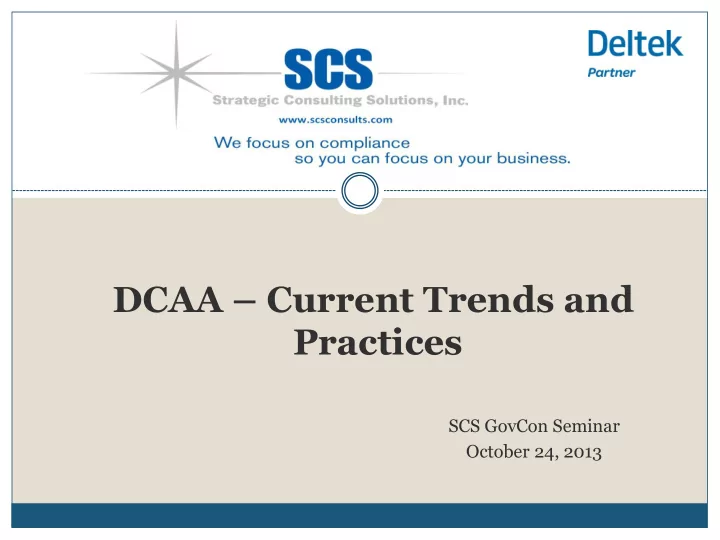

DCAA – Current Trends and Practices SCS GovCon Seminar October 24, 2013
What’s Hot 2 Incurred Cost Submissions Requirements Common Deficiencies Closer Cost Scrutiny Travel Costs Restructuring Costs Consultant Costs Current Practices Real-time Labor Evaluations Provisional Billing Rates Special Topic - Impact of Government Shutdown SCS Proprietary 2013
Incurred Cost Submissions 3 Who is required to submit an ICS? Per the Allowable Cost and Payment Clause (FAR 52.216-7(d)(2)) Allowable cost and payment clause applies to cost-reimbursement type contracts (FAR 16.307) Incurred cost claims are due six months after completion of the contractor’s fiscal year end. SCS Proprietary 2013
Incurred Cost Submissions 4 Common Deficiencies Signed certification not included or not signed by at least a Vice President or CFO (schedule N) Lack of subcontractor information (schedule J) Not all intermediate allocations disclosed (sch. D) Unallowable costs not included on G&A schedule (B) IR&D/B&P not fully burdened (sch. B) Physically complete contracts not shown on sch. I & O Government participation not calculated for all final indirect rates (schedule H-1) SCS Proprietary 2013
Increased Cost Scrutiny 5 Travel costs Includes travel costs of employees and consultants/subcontractors Contractors must be able to obtain from consultants sufficient documentation if travel costs are reimbursed Expectation of Extensive Documentation Documentation that airfare is lowest available Screening and removal of unallowable costs Justification for premium airfare SCS Proprietary 2013
Increased Cost Scrutiny 6 Restructuring costs Typically unallowable (FAR §31.205-27) DCAA closely reviews costs that may be related to restructuring, such as legal costs If a restructuring has occurred, prepare to explain nature of legal costs and why certain costs were found to be allowable SCS Proprietary 2013
Increased Cost Scrutiny 7 Consultant Costs FAR §31.205-33: fees allowable only when supported by evidence of the nature and scope of the service furnished, including: Details of all agreements, including rates and work requirements Invoices submitted by consultants, including time and nature of services Consultants’ work product and related documents DCAA position is that costs are unallowable if: No written agreement exists Work product does not exist or is not provided SCS Proprietary 2013
Current Practices 8 Labor Floorcheck Evaluating timekeeping procedures/internal controls Employee interviews Discussing the nature of work performed Verifying proper cost objectives Verifying recorded labor is fair representation Analysis of employee timekeeping practices Reconciliation of labor charges with subsequent payroll and labor distribution records SCS Proprietary 2013
Current Practices 9 The auditor will concentrate on the following: Employee’s understanding of timekeeping procedures Procedures for receiving work assignment charge numbers and descriptions How often the employee completes his/her timesheet Whether the employee includes all hours worked Timesheet Submission/Approval Process Employee’s control of timesheet SCS Proprietary 2013
Current Practices 10 Common Deficiencies from Floorchecks Timesheet not current Employee is not aware of proper method for revising timesheet Revisions not approved by Supervisor Timesheet completed in advance Time charges not representative of work performed SCS Proprietary 2013
Current Practices 11 Provisional Billing Rates Provisional Billing Rates are established to approximate the contractor’s final year -end rates, as adjusted for any unallowable costs. Provisional Billing Rates are used for interim purposes until settlement is reached on the final indirect rates for the contractor’s fiscal year. FAR 42.704-Billing Rates-provides procedures and guidance for establishing PBRs. SCS Proprietary 2013
Current Practices 12 What is included in Provisional Billing Rates Proposal? Proposed billing rate calculations (Pool and Base) with brief rationale Prior fiscal year (FY) pool and base Current FY to date pool and base Current FY budget pool and base, if available Comparative analysis with explanation of any significant differences SCS Proprietary 2013
Current Practices 13 PBRs should be monitored: Throughout the year Immediately after year-end Upon submission of the final indirect rate proposal PBRs may be adjusted by either party at any time to prevent substantial under or over payment – FAR 42.704(c). If PBRs are adjusted, the contractor should submit adjustment vouchers accordingly. SCS Proprietary 2013
Special Topic 14 Impact of Government Shutdown on Contractors Cash Flow Most small businesses rely upon President’s “Quick Pay” program to cover operating expenses Backlog of Work 2 week hiatus has created unrealistic deadlines on projects Delayed Wages for Federal Workers Issues Continue to Surface Incurred interest expenses – allowable? Impact on recoverable rates SCS Proprietary 2013
Contact Us! 15 www.scsconsults.com Laura Davis President 109A Jefferson Avenue Oak Ridge, TN 37830 Phone: (865) 813-1002 Email: ldavis@scsconsults.com SCS Proprietary 2013
Recommend
More recommend